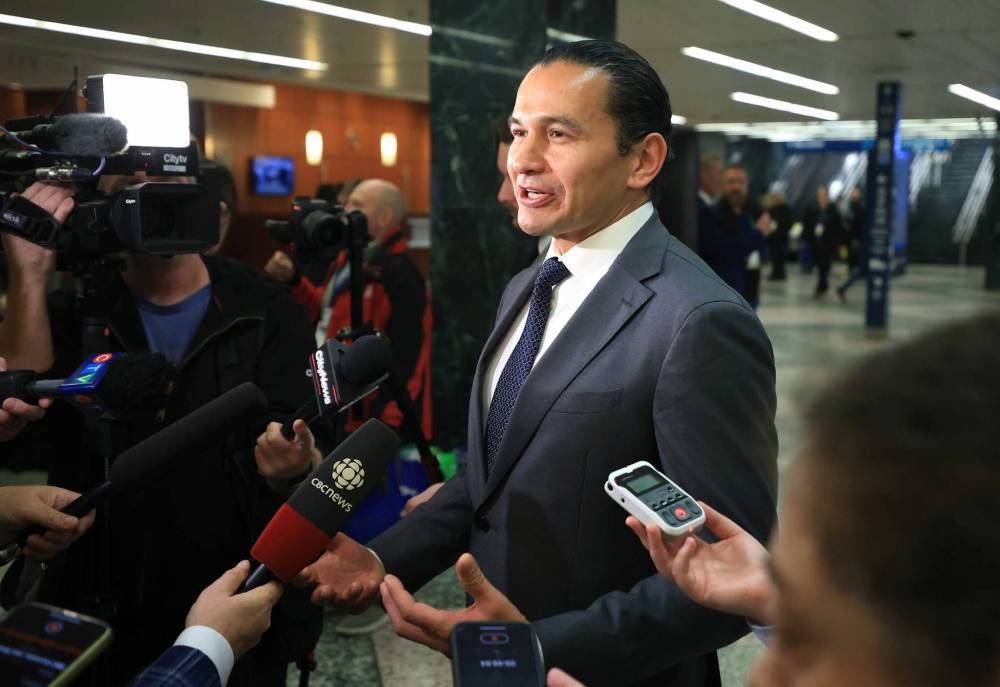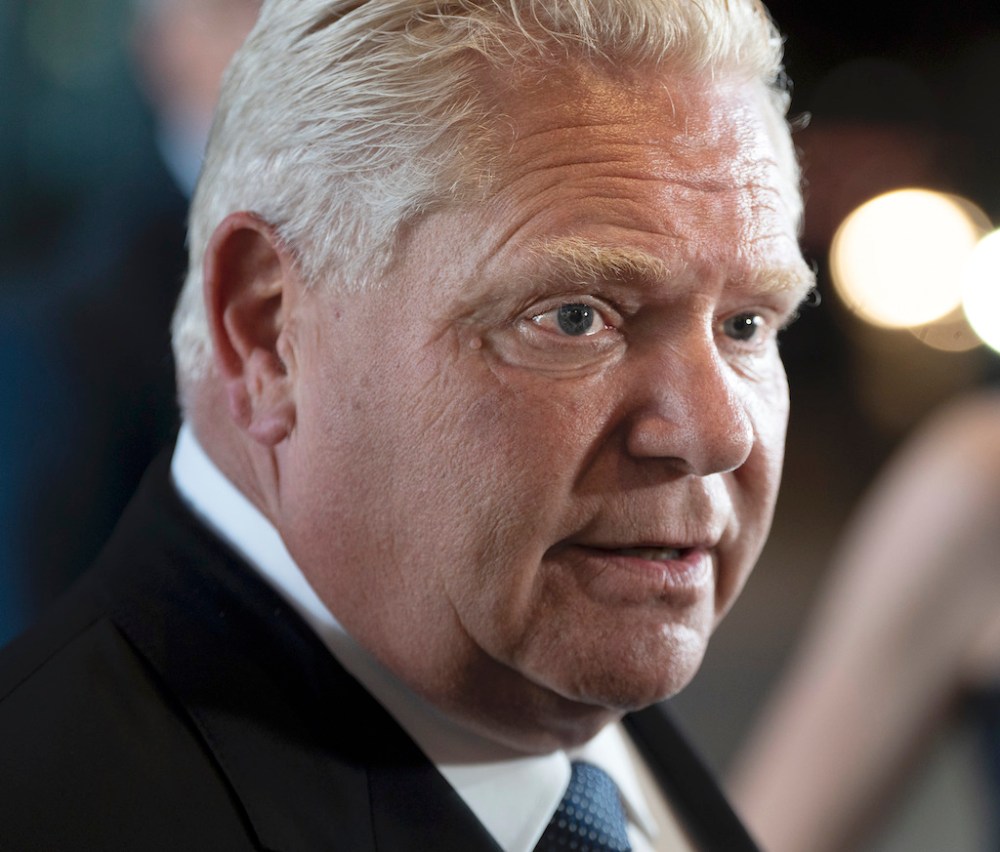Trump’s threatened tariffs will plunge Canada into recession, Kinew says
Advertisement
Read this article for free:
or
Already have an account? Log in here »
To continue reading, please subscribe:
Monthly Digital Subscription
$0 for the first 4 weeks*
- Enjoy unlimited reading on winnipegfreepress.com
- Read the E-Edition, our digital replica newspaper
- Access News Break, our award-winning app
- Play interactive puzzles
*No charge for 4 weeks then price increases to the regular rate of $19.95 plus GST every four weeks. Offer available to new and qualified returning subscribers only. Cancel any time.
Monthly Digital Subscription
$4.99/week*
- Enjoy unlimited reading on winnipegfreepress.com
- Read the E-Edition, our digital replica newspaper
- Access News Break, our award-winning app
- Play interactive puzzles
*Billed as $19.95 plus GST every four weeks. Cancel any time.
To continue reading, please subscribe:
Add Free Press access to your Brandon Sun subscription for only an additional
$1 for the first 4 weeks*
*Your next subscription payment will increase by $1.00 and you will be charged $16.99 plus GST for four weeks. After four weeks, your payment will increase to $23.99 plus GST every four weeks.
Read unlimited articles for free today:
or
Already have an account? Log in here »
Hey there, time traveller!
This article was published 26/11/2024 (410 days ago), so information in it may no longer be current.
Premier Wab Kinew has warned that Donald Trump’s pledge to slap a 25 per cent tariff on Canadian exports would plunge the country into a recession.
Trump, who will be sworn in as U.S. president Jan. 20, for the second time, issued the threat to impose steep tariffs on exports from Canada and Mexico on Day 1 of his administration unless action is taken to stem the flow of migrants and illegal drugs that cross the border.
“As everyone is aware, thousands of people are pouring through Mexico and Canada, bringing crime and drugs at levels never seen before,” Trump said on Truth Social on Monday night.

RUTH BONNEVILLE / FREE PRESS FILES
Premier Wab Kinew, pictured following his address at the Association of Manitoba Municipalities (AMM) convention on Monday, said U.S.-president-elect Donald Trump’s planned tariffs will have a “huge impact” on Manitoba.
Kinew said Tuesday the tariffs would translate to a drop in gross domestic product that equals $2,000 per person in Canada.
“That’s a huge impact,” he told delegates of the Association of Manitoba Municipalities convention in Winnipeg. “That’s something we can’t allow.”
The premier is Manitoba’s intergovernmental and international relations minister.
Kinew said federal government action on meeting NATO spending targets and bolstering the ranks of the RCMP to fight the illegal drug trade have the potential to appease Trump and reduce the tariff-fuelled economic damage on agriculture producers and other exporters.
“The premiers are united on this one,” said Kinew, who is set to participate in a virtual meeting with premiers and Prime Minister Justin Trudeau Wednesday.
On Tuesday, premiers signalled their concern about Trump’s threat; Ontario’s Doug Ford called it serious but unfounded while Quebec’s Francois Legault said tariffs would result in the loss of tens of thousands of jobs.
The emergency first ministers meeting was called after Trump issued his online missive.
The president-elect has, dating back to the beginning of his first term in office in 2017, repeatedly called out NATO member nations for not meeting security alliance spending targets of two per cent GDP.
“If Canada is not upholding our obligation in terms of what we invest in the Canadian Armed Forces, the Trump administration is going to use that as something to hit us over the head with in the trade conversation,” the premier told hundreds of AMM delegates in Winnipeg.
Kinew said the country must have strong border security and “bring the hammer down” on drug trafficking to avoid the tariffs.
To do that, the province needs more “boots on the ground,” he said.
“If we’re able to address the RCMP staff shortage, I think that would benefit every single municipal leader here in this room, it will benefit your ratepayers, the local citizens and make communities safer.

Darren Calabrese / THE CANADIAN PRESS FILES
Ontario premier Doug Ford: tariff threat serious but unfounded.
“It would also set the stage for a much better trade conversation … it’s going to benefit us with public safety with the addiction crisis and also with the economy and, hopefully, prevent that $2,000 (GDP) impact,” Kinew said.
National Police Federation president and CEO Brian Sauvé said he supports Kinew’s call for more RCMP hires. In an emailed statement, Sauvé, whose union supports Mounties nationwide, said the union has asked the federal government for increased funding.
Ahead of the 2025 federal budget, the federation has asked Ottawa to spend $300 million over four years to hire 1,000 RCMP officers to bolster federal policing programs, including border security.
On the trade side, Manitoba’s trade with the U.S. sits at about 73 per cent of the province’s exports, which equates to about $15 billion annually, as per Manitoba Chambers of Commerce president Chuck Davidson.
Davidson says the proposed tariff would affect virtually all sectors, including manufacturing, transportation, aerospace, pharmaceuticals and agriculture.
“Everyone’s concerned. It’s sounding the warning bells that this is a big issue,” he said. “Whether it’s rhetoric or not, the impact on the Canadian economy and on each of our provincial economies is significant.”
“Essentially our largest market would be taken away.”–Cam Dahl, Manitoba Pork general manager
Davidson was in Ottawa Tuesday for an unrelated conference involving Western Canadian companies and chambers from other provinces to discuss issues most important to Manitoba. Trade between U.S. and Canada dominated most meetings, Davidson said.
“What steps is the federal government going to take? Are they going to reciprocate and put a 25 per cent tariff on all goods coming from the U.S. into Canada?” he said. “This is not necessarily the relationship that you want to have with your best trading partner.”
Alex Garfinkel, a cattle farmer in Grosse Isle, said the incoming U.S. president’s proposal is “troubling” but the threat is vague.
Garkfinkel hopes any tariff that is imposed is short-lived after pressure from U.S. beef processors and consumers who will pay the price.
“I’m concerned, but faithful that the policy outlined… will show damage to the U.S. processors and consumers costs and be short-lived,” he said Tuesday.

Allison Robbert/Pool via AP
U.S. President-elect Donald Trump threatened to impose steep tariffs on exports from Canada and Mexico unless action is taken to stem the flow of migrants and illegal drugs that cross the border.
The pork industry would be devastated by a 25 per cent tariff, said Manitoba Pork general manager Cam Dahl.
Manitoba producers raise about eight million pigs per year and 90 per cent are either exported as live animals or traded to the U.S. as a pork product. The industry generates $2.3 billion to the province’s annual gross domestic product, Dahl said.
“Essentially our largest market would be taken away,” he said.
Protectionism has been growing in the U.S. and the provincial and federal governments should have started responding to it before Trump’s remarks by continuing to dialogue with its American counterparts on the importance of trade with Canada, Dahl said.
“We need to show them what the cost to their own consumers will be if this protectionist move goes ahead,” he said.
Davidson says his group has lobbied for Manitoba to establish an office in Washington to foster regular dialog with decision makers about policy.
“This isn’t something that’s simply at the feet of the president of the United States. This is something that impacts local senators, governors, it impacts local Congress (representatives). So they need to have a better understanding of what that relationship with Canada is,” he said.
carol.sanders@freepress.mb.ca
nicole.buffie@freepress.mb.ca

Carol Sanders
Legislature reporter
In 1997, Carol started at the Free Press working nights as a copy editor. In 2000, she jumped at a chance to return to reporting. In early 2020 — before a global pandemic was declared — she agreed to pitch in, temporarily, at the Free Press legislature bureau. She’s been there ever since.
Our newsroom depends on a growing audience of readers to power our journalism. If you are not a paid reader, please consider becoming a subscriber.
Our newsroom depends on its audience of readers to power our journalism. Thank you for your support.
History
Updated on Tuesday, November 26, 2024 5:44 PM CST: Adds details
Updated on Tuesday, November 26, 2024 7:34 PM CST: Updates spelling of name















